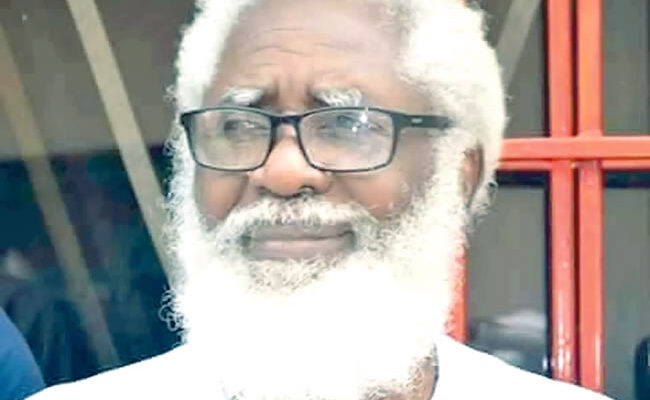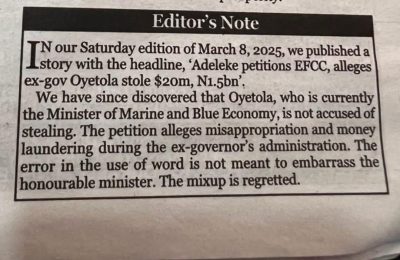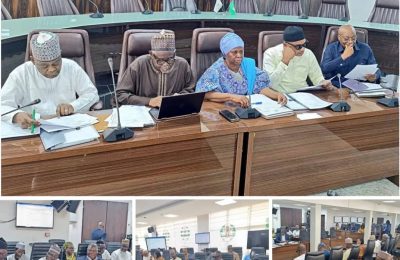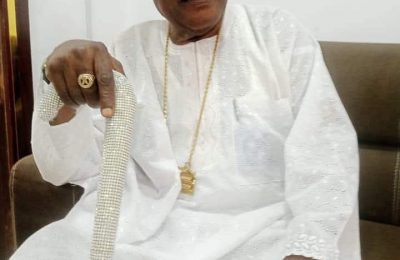
Nigeria’s Former Ambassador to the Philippines and Filmmaker, Dr Yemi Farounbi, has revealed that he discovered veteran Nollywood actor, Ojo Arowosafe popularly known as Fadeyi Oloro, and Folake Aliu better known as Orisabunmi by accident.

He disclosed this during an interview with Nigerian Tribune, where he discussed in details his journey in the Entertainment industry and how he helped discover talents.
On how he got into filmmaking and his years of trade, he said, “When, eventually, I left the Nigerian Television Authority (NTA), my mind was made up that I was going to go into filmmaking. That was ever before I had to work with the Oyo State government under Governor Bola Ige in setting up the Television Service of Oyo State (TSOS). I was planning to make a film called King Henri Christophe. This was the story of a black man who became the king of Haiti. He was reputed to have led the troops of Haiti to defeat the troops of Napoleon Bonaparte. So, I was trying to make that film from the point of view of projecting the Yoruba culture because quite a number of things that you find in Haiti today originated from Yoruba. They say they have voodoo. They said that they have voodoo instead of juju. In Haiti at that time, if you had malaria, they will make a concoction for you and cover you with a big cloth so that you can sweat it. That was what I was trying to raise funds to do when Governor Bola Ige invited me to come and start the Oyo State television. So, when I finished that assignment and left the government after Chief Bola Ige lost his election, I came back to the film industry. I had resolved in my mind, after I couldn’t do the King Henri Christophe which was in English, that all my films or all my TV productions would be in Yoruba. This was because I found that that was a way of marketing our culture and propagating our culture, the way the Indians do. You will find that the bulk of Indian films is in their language. They can do an English summary of the films. So, I therefore came into film industry. Before I did my major films, I did a few TV programmes. I did Igba Oro with Jimoh Aliu Group that I had discovered when I was General Manager, NTV Akure. Eventually we did Arelu that swept the whole of the South West. We didn’t do it only in Oyo State, we syndicated it all over the Yoruba states. So, by the time we now went into my film, Agba Arin, we had established a name. I also did another film based on Adebayo Faleti’s Idaamu Paadi Mikailu ‘The Dilemma of Father Michael’; we called it ‘Iwa’. So, that was how I got into the film industry.”
About Yanponyanrin, Farounbi said, “Yes, I produced Yanponyanrin parts 1 and 2 on television using the Jimoh Aliu Troupe. I did Agbeleku using the Olagunju Troupe. I also did Omo Inu Oku with another troupe. I must have done about eight of such TV productions. All these works were generally trying to expose the triumph of good over evil.”
READ ALSO: Veteran Actor Fadeyi Oloro Is Dead
When asked about his relationship with veteran actors like Chief Jimoh Aliu (Aworo); Folake Aliu (Orisabunmi) and Ojo Arowosafe (Fadeyi Oloro), Farounbi said “I had the privilege of being divinely used to promote this group because they were largely unknown and were based at No 6 Ilepa Street in Ikare-Akoko. But I came in as the GM of NTV Akure and a lot of the artistes who were featuring with me when I was GM in Ibadan wanted to go along with me – the Alawada Group, the Ajimajasan Group, the Awada Troupe and all of that but I didn’t like that because I wanted to create in NTV Akure drama successes using the talents in Akure.
“So, one of my staff members told me about Jimoh Aliu and I said they should bring him and we met. He was heavily bearded like me and a lot of people used to call us twins. So, when I now found him, I did Igbo Olodumare with him. When I was in Ibadan, we had done Igbo Irunmole with Duro Ladipo. Before Duro Ladipo passed away he and I had agreed that we would do Aditu Olodumare. Unfortunately he was sick, came to UCH and never came back. So, when I got to Akure, I wanted to use indigenous groups there and there were quite a large number of them, but the primary one was the Aworo (Jimoh Aliu) group.
“It wasn’t Ojo Arowosafe that was Fadeyi then, it was Daramola, and it was his wife, Ramota Daramola, that was Orisabunmi. Circumstances created a change. We had a live show at the Oduduwa Hall, Amphi Theatre Theatre of the Obafemi Awolowo University.
“Having made some remarkable impact on the society because of the television production of Igbo Olodumare where Jimoh Aliu featured as Olowo Aye. We got there for the stage play, the hall was filled up with students but we didn’t find the then Orisabunmi (Ramota) and we didn’t find the then Fadeyi (Daramola) who was called Egbeji much later. They didn’t show up, we had the crowd and you know what students can be.
“They had paid and it would be difficult if we didn’t go on with the show. Ojo Arowosafe used to act as the son of Fadeyi, he was Fabunmi as a matter of fact. He used to follow him on stage and so on. So, he told us that he could act the role as he had been following him on stage, that he knew all the nuances, incantations and all others like that. Because we were desperate, we scheduled him to be Fadeyi that day and we scheduled Shade Aliyu to do Orisabunmi. Happily they did very well. In fact they did so well that the students were riotous in appreciation.
“So, we had almost finished when the Daramolas came and they found that we had not been let down and that the crowd response was something else. So, they pleaded with me that they would act the next day and I said no, that the students would stone me if I now change the people that they had joyously reacted to. That was how we eased out the Daramolas.
“One of the great things about production is location. When you have a good story, you must have a good location, the costume, good design and good characters that would translate the story. So we chose to do a recording at Omu Aran and on our way, we always stopped at Sunny Stores at Ilorin. The owner (Sunny) was from Ido-Ekiti, very near my mother’s home town, Usi-Ekiti.
So, we stopped there and in the office of Sunny one day while we were eating breakfast on our way to Omu Aran we heard somebody singing. It was like Ijala and I asked ‘who is this?’ They said it was the accountant or cashier – something like that. I asked Sunny to bring the lady. I asked there and then her if she could join us in the production because it would appear that the sonorous song was indigenous to her family. She was born into it. We decided we would use her and that was how she became Orisabunmi.
“After this experiment, we didn’t take Daramola as I said and we decided to upgrade Ojo Arowosafe from being Fabunmi to Fadeyi. Of course he was more dramatic. Of all the artistes I met when I was in production, Ojo Arowosafe was the easiest to train. Oh, you need to see his movement on stage. He could adapt to any role. He was just great. He was such an artiste that could act yourself in your place.
“I saw some artistes that could not act anything except Oba, or except the boss. He was as good as Kola Ogunmola and he could act any role and he was very mobile, very fluid. He was very teachable and he was more fearsome as Fadeyi.
“So to distinguish him, we now called him Fadeyi Oloro. Because God had used me in identifying them, in doing Igbo Olodumare, later on Igba Oro, later still Yanponyanrin and subsequently Arelu, and featuring them in Agbarin, we had a really very close relationship. It was because of that I discovered that one of his wives, Iya Ige – she died much earlier, was in fact a relation of my mother’s. So, we operated almost like a family. All his children and Jimoh’s children still get across to me till today. So, we had a wonderful relationship.”








